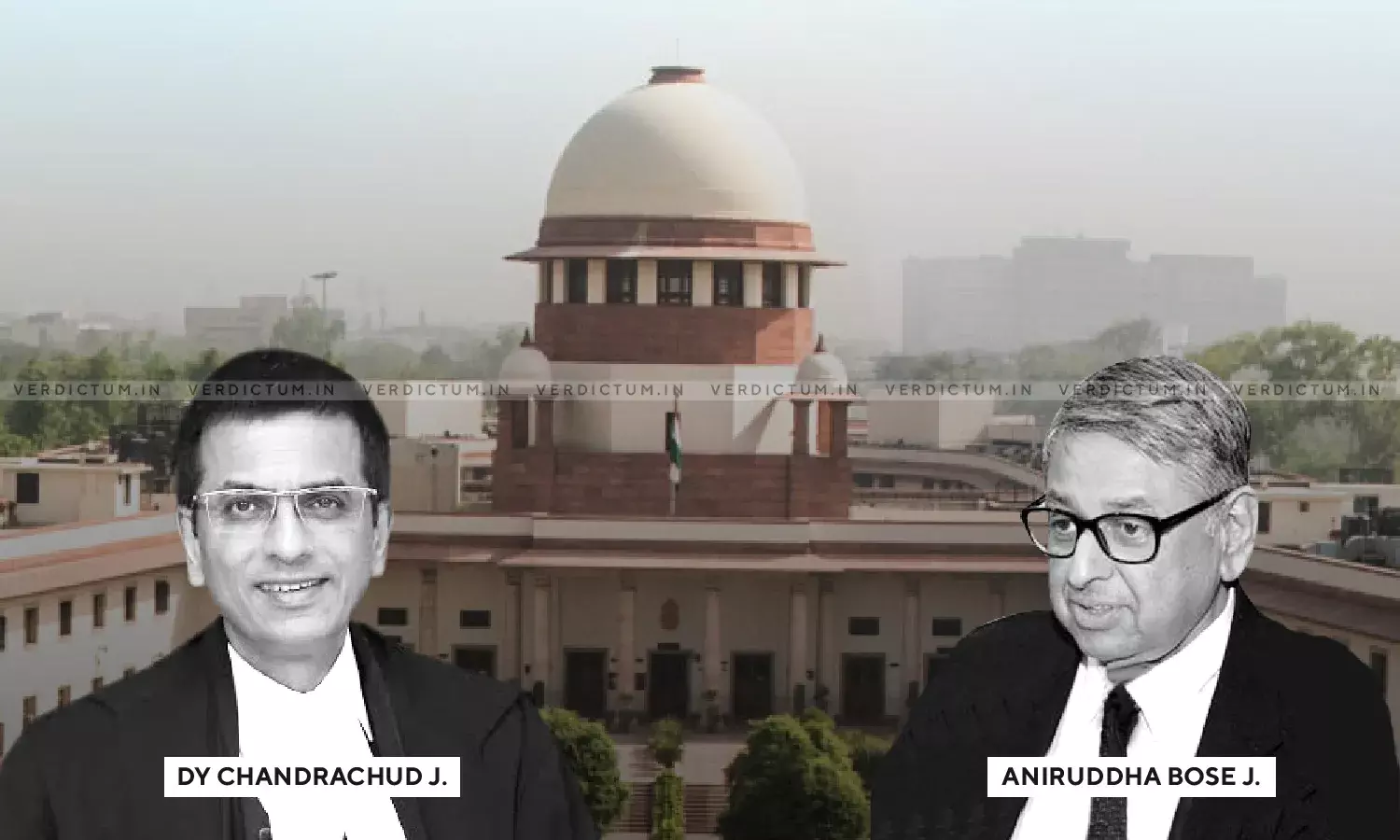Presiding Officer Must Consider All Relevant Factors For Grant Of Remission U/s. 432 (2) CrPC - Supreme Court
A Supreme Court Bench of Justice Dhananjaya Y Chandrachud and Justice Aniruddha Bose heard a petition seeking pre-mature release, which was instituted by a convict undergoing a sentence of life imprisonment for offences punishable under Section 302 read with Section 149 of IPC.
The Bench in this context held that when an application for remission has been made under Section 432 CrPC by the accused, the presiding officer should take into consideration all the relevant factors under Section 432(2) CrPC to adjudicate whether remission should be granted or rejected.
The Court also held that when the presiding officer doesn't take into consideration all the relevant factors for the grant of remission, the Government may request the presiding judge to consider the matter afresh.
Mr MD Irshad Hanif appeared on behalf of the Petitioner and Mr Sumeer Sodhi appeared on behalf of the Respondents.
The Petitioner and co-accused had assaulted the complainant and killed his father and co-accused, owing to an enmity caused by the confiscation of wood. The Trial Court convicted the Petitioner and the other accused and sentenced them to life imprisonment. The sentence was confirmed by the High Court. The Petitioner preferred an SLP before the Supreme Court, which was dismissed.
The Petitioner completed 16 years of imprisonment without remission and submitted an application for premature release under Rule 358 of the Chhattisgarh Prisons Rule 1968. The Jail Superintendent of the Central Jail sough the opinion of a Special Judge regarding whether the Petitioner should be released on remission. The Special Judge opined that in view of the facts and circumstances of the case, it would not be appropriate to allow remission of the remaining sentence of the petitioner.
A number of authorities including the Law Department and Jail Department concluded that the Petitioner cannot be given the benefit of remission since the Presiding Judge of the sentencing court had not given a positive opinion with regard to the release of the Petitioner.
The Counsel appearing on behalf of the Petitioner mainly contended that while the government is bound to seek the opinion of the sentencing court under Section 432 (2) of the CrPC, it is not bound by the opinion itself. Further, relying on the judgment passed in Sangeet vs State of Haryana, the Counsel argued that the opinion of the Presiding Judge of the sentencing court must be accompanied by reasons, but the Presiding Judge had only simply stated his opinion and there was nothing to indicate that the judge took the antecedents, conduct, and likelihood of committing a crime of the Petitioner into account.
Relying on judgments, the Counsel appearing on behalf of the Respondents contended that the opinion given by the Presiding Judge is binding on the government and that the order remission should be guided by the opinion of the Presiding Officer of the sentencing court and that a convict does not have a right to remission, but only a right to claim remission. Further, the Counsel contended that the government has the sole discretion to remit or refuse to remit the sentence of a convict, and no writ can be issued to the government to release the prisoner.
Relying on a catena of judgments like Laxman Naskar vs Union of India, the Supreme Court opined that it was clear that the Court has the power to review the decision of the government regarding the acceptance or rejection of an application for remission under Section 432 of the CrPC to determine whether the decision is arbitrary in nature and that the Court is empowered to direct the government to reconsider its decision.
"...However, this is not to say that the appropriate government should mechanically follow the opinion of the presiding judge. If the opinion of the presiding judge does not comply with the requirements of Section 432 (2) or if the judge does not consider the relevant factors for grant of remission that have been laid down in Laxman Naskar v. Union of India (supra), the government may request the presiding judge to consider the matter afresh," the Bench opined.
After analyzing a number of judgments dealing with the value of the opinion of the Presiding Judge, the Supreme Court opined that "an opinion accompanied by inadequate reasoning would not satisfy the requirements of Section 432 (2) of the CrPC. Further, it will not serve the purpose for which the exercise under Section 432 (2) is to be undertaken, which is to enable the executive to make an informed decision taking into consideration all the relevant factors."
Therefore, the Supreme Court held that the Petitioner's application for remission should be re-considered. The Court directed the Special Judge to provide an opinion on the application afresh accompanied by adequate reasoning that takes into consideration all the relevant factors that govern the grant of remission as laid down in Laxman Naskar v. Union of India, and the State to take a final decision on the Petition.Click here to read/download the Judgment












